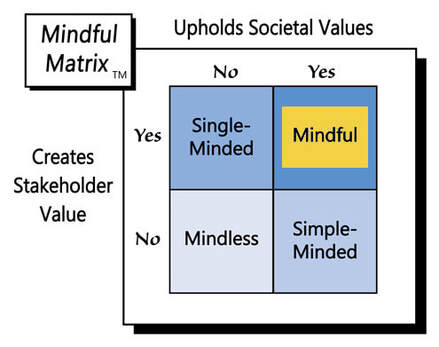author of Honorable Influence - founder of Mindful Marketing
If your newsfeed is like mine, it overflows with articles describing organizations’ creative and sometimes controversial use of artificial intelligence; for instance, recent news stories have included:
- A Beatles song made with AI
- Results showing that ChatGTP makes up things 3% of the time
- Tom Hanks disavowing a deepfake dental ad video
- Empathetic AI helping to heal broken office relationships
By now, AI has touched most industries in more ways than one, which is part of the reason the U.S. government and those of several other nations are taking more active and deliberate approaches to support AI development. By doing so countries can gain competitive advantage, enhance national security, and reduce negative impacts on their citizens.
On a personal level, parallel goals should motivate individuals’ use of AI. I’m not a tech expert or an authority on artificial intelligence, but several years ago I suggested a simple model for personal branding that might also serve as a useful guide for individual AI use. The 3Cs of personal branding – competencies, character, and communication can help frame how individuals should and shouldn’t use AI.
1. Competencies: What a person can do well; their skills, talents, and aptitudes.
The ability to use AI is already a competency that many employers want and that many more will demand over the coming months and years. However, experience alone with AI won't suffice. Competent users of AI should be able to:
- Choose the right AI tool – since the rapid ascension of ChatGPT, a variety of other chatbots and AI tools have emerged, some of which are tailored to particular types of information, e.g., Jasper for business and marketers and Chatsonic for news content creators.
- Ask AI the right questions – ones that effectively and efficiently enable the chosen chatbot to locate the right information and offer truly helpful responses
- Identify errors – those that use AI often mention times when the technology makes mistakes, sometimes retrieving the wrong information and other times even fabricating facts.
2. Character: The kind of person someone is – Are they decent, fair, and honest? Do they show others respect and demonstrate social responsibility?
While personal branding for AI competency primarily involves what people should do, AI-related character largely describes things that individuals shouldn’t do, such as:
- Suggest that work is one’s own when it was created largely or entirely by AI
- Fail to give proper attribution, or credit, to others whose work AI appropriated
- Forward AI results not checked for accuracy or that contain known mistakes
- Share indecent content such as profane language, crude pictures, or other offensive subject matter generated by AI
3. Communication: How a person informs, persuades, or reminds others about their brand
There’s a growing number of AI products that can help users communicate more effectively. In a recent LinkedIn article, James Lusk highlighted several of the tools. The ones that seem best suited for positive personal branding are:
- Grammarly – to improve one’s writing mechanics. But users shouldn't use it to write substantial content then claim authorship.
- Zoom.ai – to manage communication tasks, including scheduling meetings and sending reminders. The tool also can be used to draft emails, so again, users should be careful to not give the impression they’ve written something they haven’t
- Chorus.ai – to improve communication skills by analyzing one’s communication style, including interruptions, tone, and speaking pace
AI users also should be careful not to give others a false impression of what they’re like physically or otherwise, which can happen when using apps such as AI face enhancers.
Like other technology, AI is tool that can be used in good ways and in bad ways. As its rapid evolution continues, there’s no guarantee that AI will hold itself to any compelling moral standards. More likely, it will be individuals who accept personal ethical accountability and model it for others, thereby guiding AI's “Mindful Marketing.”
Learn more about the Mindful Matrix.
Check out Mindful Marketing Ads and Vote your Mind!




 RSS Feed
RSS Feed